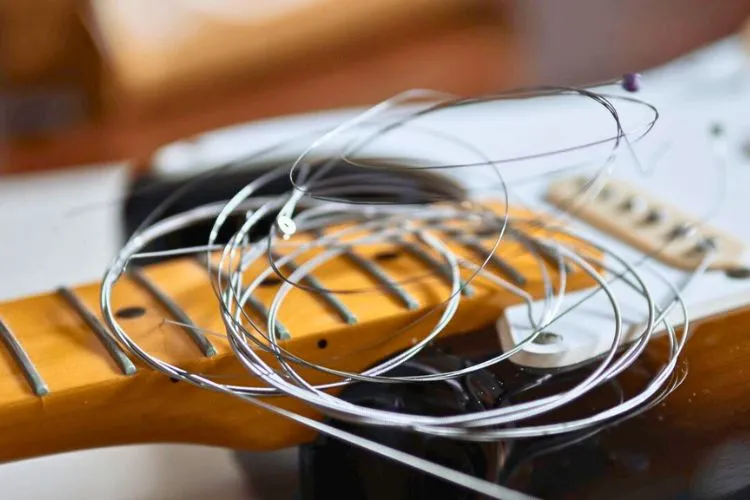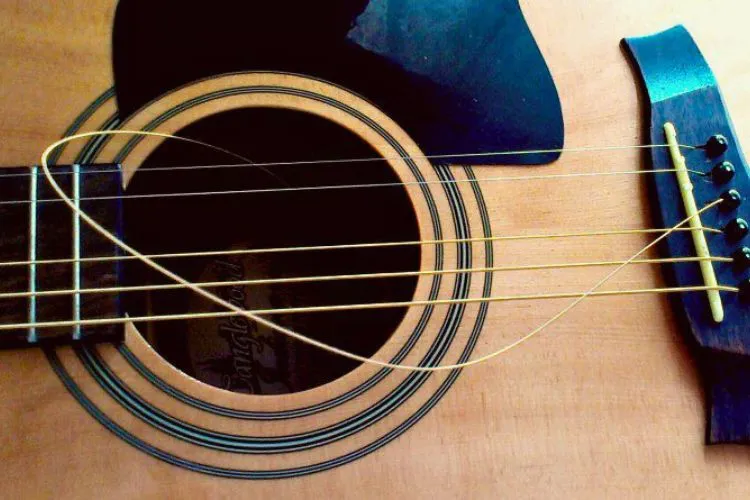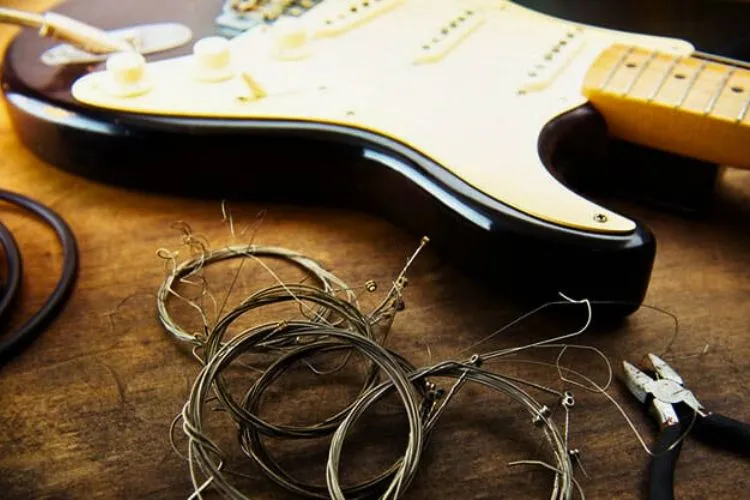A broken string can quickly change your mood when you are enjoying playing guitar! This article will dive into the intriguing question: How often do guitar strings break?
I’ll explore the factors that influence string durability, common causes for breakage, and how you, as an aspiring guitarist or a professional musician, can maximize the life of your strings. So, grab your guitar and let’s uncover the secrets to keeping your strings strumming for longer.

Contents
🎶How often do guitar strings break?
The frequency of guitar strings breaking largely depends on usage and maintenance. Regular, heavy use can cause them to break as often as every 1-3 months. However, in optimal conditions with proper care, they can last up to a year. Factors influencing their longevity include playing style, frequency and duration of playing, care and maintenance, and environmental conditions.
Regular cleaning, appropriate tuning, and using good quality strings can vastly improve their lifespan. Ultimately, each guitarist’s experience may vary, and paying attention to changes in sound or playability is key to determining when to change the strings.
🎶How often do electric guitar strings break?
Electric guitar strings, like their acoustic counterparts, typically break due to factors including playing style, frequency and duration of playing, maintenance, and environmental conditions. However, these strings tend to be more durable because they are typically made from steel or nickel, which are stronger materials than the bronze or nylon used in acoustic guitar strings.

An electric guitarist who plays vigorously for several hours daily may see strings break every 3-4 weeks, while a more casual player might only require replacement every 3-6 months, or even less frequently. Maintenance habits, such as cleaning the strings after every session and using a guitar case to minimize exposure to adverse environmental conditions, can significantly prolong string life.
Also important is the factor of tonal degradation; even if an electric guitar string doesn’t break, repeated strumming gradually wears down the string’s material, leading to duller sound. Many players thus choose to replace their strings periodically to maintain optimal sound. As such, individual experiences regarding string breakage can greatly vary.
🎶How often do acoustic guitar strings break?
Acoustic guitar strings, made from materials like bronze or nylon, are generally less durable than electric guitar strings. The frequency of breaking depends on a variety of factors including playing style, frequency and duration of playing, maintenance, and environmental conditions.

A frequent player with a hard-strumming style might break strings as often as every 2-4 weeks, while a casual player may only need replacements every 4-6 months. Consistent maintenance, including wiping down strings after playing, using proper string tension, and protecting the guitar from humidity and temperature fluctuations, can help extend string life.
It’s important to note that acoustic guitar strings also degrade tonally over time. Even if they don’t break, the strings can become dull and less resonant, prompting players to change them more frequently to maintain optimal sound quality. Consequently, individual experiences with string breakage and the need for replacement can greatly vary for acoustic guitarists.
🎶Do guitar strings go bad without playing?
Yes, guitar strings can go bad even without frequent playing. They are susceptible to elements like humidity, temperature fluctuations, and oxidation, which can all degrade them over time.
Oxidation is a primary factor in the degradation of unused guitar strings; even in their packaging, strings can oxidize, especially in environments with high humidity and temperature. They may lose their tone, feel less flexible and more brittle, and start to discolor. Thus, it’s recommended to store guitar strings in a cool, dry place, and ideally in a vacuum-sealed package, to help prevent such issues.
🎶How often do pros change guitar strings?
Professional guitarists tend to change their strings more frequently to maintain optimal sound quality. Some professionals change them daily, before each performance, in the studio session, or even multiple times during a session, depending on their requirements.

Others may change them weekly or bi-weekly, depending on various factors like their playing style, the genre of music, the type of strings used, and the desired sound. Ultimately it varies from musician to musician, but the priority for professionals is always to produce the best possible sound.
🎶How do I know when my guitar strings need replacing?
Identifying the need to replace your guitar strings is based on a combination of factors. First and foremost, if the strings break, they definitely need to be replaced. Other signs of needing a replacement include losing tuning frequently, a noticeable loss in the guitar’s tone or resonance, visible discoloration or rust on the strings, and a feeling of roughness or brittleness under your fingers.
Strings might also form kinks or indentations from coming into contact with the frets. If your guitar isn’t sounding, playing, or feeling as good as it used to, it might be time for a string replacement.
If you have a classical guitar you find this useful: Best Capo for Classical Guitar
Conclusion:
If you are wondering how often do guitar strings break? The frequency of guitar string breakage varies greatly depending on several factors—usage, care, environment, and the type of guitar and strings in use. Whether you’re a novice guitarist or a seasoned player, being aware of these factors can help prolong your strings’ lifespan and ensure optimal sound quality.
Remember, while the occasion of a string breaking can induce a temporary dissonance, it also leads to the harmony of fresh strings and perhaps an opportunity to try a new set or type. Keep strumming, maintaining, and experiencing the rich, evolving journey of guitar playing.
